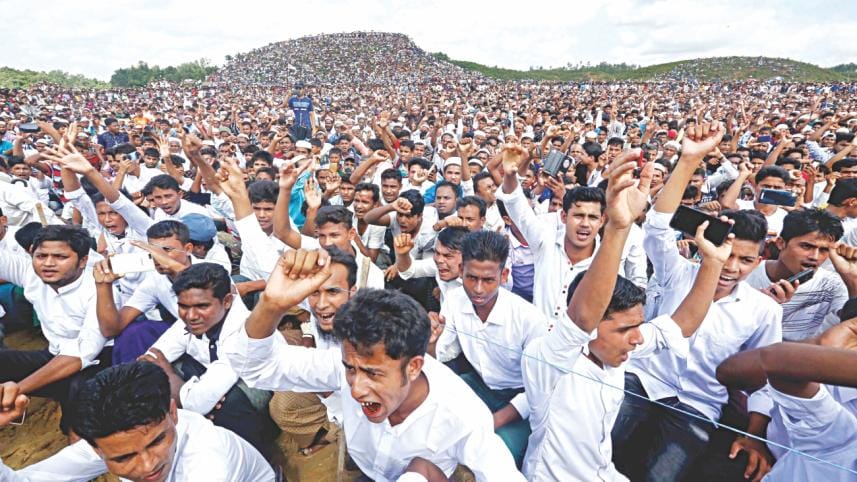Atrocities in Rakhine: Rohingyas call for justice

Thousands of Rohingyas yesterday rallied in the refugee camps in Cox’s Bazar, urging the international community to ensure justice for the atrocities the Myanmar military committed against them.
Marking the second anniversary of the start of a brutal military crackdown on them in Rakhine, they reiterated their demands for guaranteed citizenship, return to their homes in Rakhine State and safety there.
Over 743,000 Rohingyas fled the atrocities that included killings, rape and arson attacks on their houses in Rakhine where they have been denied citizenship since 1982 and other basic rights though they lived there for generations.
Though Myanmar made commitments to create conditions conducive to the return of the Rohingyas, the UN says the situation in Rakhine is not right for their repatriation.
Two repatriation attempts -- one on November 15, 2018, and the other on August 22 this year -- failed as Rohingyas refused to go back, saying there is no guarantee for citizenship and safety there.
To commemorate the day, the Rohingyas -- men, women, children and the elderly -- all gathered in huge numbers at a field adjacent to Camp-4 extension in Ukhyia Upazila’s Kutupalong where a large makeshift stage was set up.
The rally, organised by Arakan Rohingya Society for Peace and Human Rights (ARSPH), began around 7:30am and continued for nearly five hours.
Some of the Rohingyas wore T-shirts imprinted with a slogan, “Ensure justice for the Rohingyas”. Many took positions on the hills around the field to listen to their leaders.
Another rally was organised at Unchiprang refugee camp in Teknaf.
At the Kutupalong rally, ARSPH Chairman Mohib Ullah said they no longer trust Myanmar.
He urged the world leaders to intensify pressure on the Southeast Asian country to create a favourable environment for their return to the motherland and hold accountable the perpetrators of genocide.
Mohib further said they want to go back to their ancestral land, not to the camps readied by the Myanmar authorities. But before they return, Myanmar must ensure a safe environment under supervision of the world community.
“Myanmar must give back citizenship we had been stripped of in 1982, acknowledge Rohingyas as an ethnic community, bring to book those involved in mass killings of Rohingyas and ensure our free movement,” he noted.
Many of the refugees broke down in tears, recalling the atrocities two years ago what the UN described as a “textbook example of ethnic cleansing”. The UN fact-finding mission said the military crackdown had genocidal intent.
An international research last year said an estimated 25,000 Rohingyas got killed and 19,000 Rohingya women and adolescents were raped during the military crackdown in Rakhine since late August, 2017.
The research, conducted by a consortium of academics and organisations from Australia, Bangladesh, Canada, Norway and the Philippines, also found that around 43,000 Rohingyas suffered bullet wounds, 36,000 were thrown into fire and 116,000 beaten up by the Myanmar authorities.
At the Kutupalong rally, Rohingya singer Nur Hossen portrayed the ordeal of the Rohingyas through his songs.
“We will never forget the genocide. We will never cease to demand our rights. God willing, our dream of returning to the motherland will come true one day,” he told this newspaper after the rally, sharing the emotions of other community members.
Md Younus from Lambasia refugee camp said he still repented for leaving behind his bullet-hit brother during the crackdown in Rakhine two years ago.
“I fled the massacre and saved my life. But I didn’t have the courage to save my brother who collapsed after being hit by bullets sprayed by Myanmar army personnel. I often have nightmares,” he told this newspaper.
The Rohingyas said they were willing to go back only if their demands are met. Otherwise, they would prefer to live in cramped refugee camps no matter how much hardship they have to go through.
“Please, don’t push us towards death traps. If a safe condition is not ensured, we won’t go back. If you really care about our life, please don’t force us to leave,” Sheikh Ahmed, an elderly refugee from C-block of Camp-1, told this correspondent.




 For all latest news, follow The Daily Star's Google News channel.
For all latest news, follow The Daily Star's Google News channel.
Comments